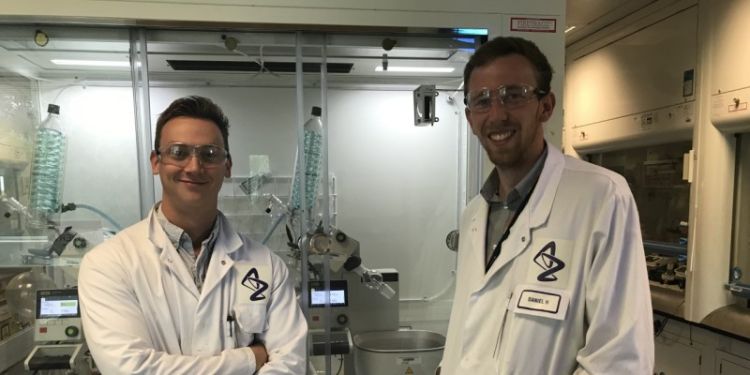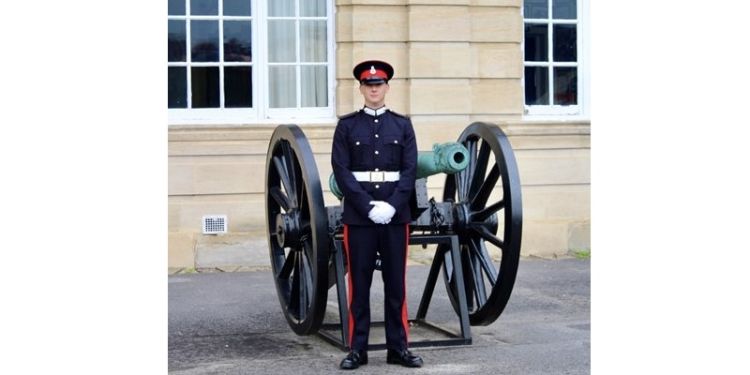
Archie Meager
- Course: Chemistry with a Year in Industry MChem, BSc
- Year of graduation: 2020
- Job title: British Army Officer
- Company: Army Air Corps
Archie graduated from the University of Leeds in 2020 with a MChem BSc degree in Chemistry with a Year in Industry. He worked for AstraZeneca as a Synthetic Organic Chemist during his year in industry, and after graduation, he attended the Royal Military Academy Sandhurst and was commissioned as a British Army Officer.
Undergraduate life at Leeds
“Chemistry had always fascinated me throughout school, particularly Organic chemistry. I think the challenge of constructing complex molecules from basic, readily available materials was a challenge I thrived on. I wanted to study chemistry as a degree as I believed it would allow me to develop a broad range of transferable skills that would be beneficial in a variety of different career streams.

When I first visited the University of Leeds on an Open day, I immediately knew it was a place that I’d be able to flourish in; both academically and socially. The staff in the School of Chemistry were extremely kind and well-humoured, which made it a great environment to learn in. This, coupled with its reputation as a world class institution meant the University of Leeds was an obvious choice for me.
The staff in the School of Chemistry were extremely kind and well-humoured, which made it a great environment to learn in.
For me, one of the best aspect of the course was the flexibility in the modules you were able to take. A great thing about chemistry is the diversity of the subject, as it has applications in many walks of life. Being afforded the flexibility to mould your degree to fit your interests was exciting, as it allowed me to explore areas of chemistry I may have not thought about before.
Being afforded the flexibility to mould your degree to fit your interests was exciting, as it allowed me to explore areas of chemistry I may have not thought about before.
Year in Industry

For his year in industry, Archie worked for AstraZeneca as a Synthetic Organic Chemist, based in Cambridge. During his time with AstraZeneca, he worked within the Oncology department developing novel medicines for oncological targets.
It was a fast-paced, exciting environment and I found working on drugs that had the potential to change patients’ lives for the better extremely rewarding.
He said, “It was my teams’ job to synthesise a library of compounds, which would then be sent for biological testing against a particular target. I was responsible for regularly devising synthetic routes before making the compounds. Within a typical day, I would spend 90% of time in the lab carrying out reactions or purifying compounds. It was a fast-paced, exciting environment and I found working on drugs that had the potential to change patients’ lives for the better extremely rewarding. Due to the extent of time I spent within the lab setting, it was my synthetic ability that improved to the most. By the end of the year, I felt comfortable using the specialist equipment and confident in being able to problem solve if something didn’t go according to plan. This was recognised by the Royal Society of Chemistry through the professional award of Registered Scientist (RSci) – an excellent opportunity available for anyone undertaking a year in industry. This helped me immensely going into my final master’s year, where I again worked in an Organic chemistry lab and was able to bring the skills that I had learnt from AstraZeneca back to Leeds.
By the end of the year, I felt comfortable using the specialist equipment and confident in being able to problem solve if something didn’t go according to plan.
Life after Leeds
After university, Archie went on to attend the Royal Military Academy Sandhurst (RMAS) and was commissioned as an Officer in the British Army. He found the 44-week long course challenging but a hugely rewarding experience.
“I was commissioned into the Army Air Corps (AAC) as an Officer Pilot, however I am currently attached to a Calvary regiment whilst I wait for my flying training to begin. The Army Air Corps is the combat aviation arm of the British Army, who fly the Wildcat and Apache attack helicopters.
I don’t believe there is a ‘typical day’ in my current role; it is hugely varied and one of the reasons why I love it. One day you could be leading soldiers on a multinational exercise, and the next you could be skiing in the Alps on an adventurous training expedition.

Whether it is a problem presented by a soldier or devising a difficult synthetic route; the need to dynamically analyse and construct practical solutions to a problem is paramount.
Even though it may seem like a far cry from chemistry, there are many parallels that can be drawn between the two professions. Firstly, there is the need for constant problem solving. Whether it is a problem presented by a soldier or devising a difficult synthetic route; the need to dynamically analyse and construct practical solutions to a problem is paramount.
Secondly is the need for teamwork. In both the British Army and chemistry, teamwork is essential for success. Having the chance to work in a collaborative environment throughout university and during my year in industry really showed me the benefits of working within a team.”
Advice
“My advice for prospective students thinking of studying chemistry at the University of Leeds would be to take every opportunity and immerse yourself in university life. I believe that in doing this you’ll genuinely get the most out of your time in Leeds and maybe even find a passion for an area of science you didn’t know about. Leeds is also a great city, take time to explore it – it won’t disappoint!”
Find out more
Discover more about our Undergraduate degree courses in the School of Chemistry.

